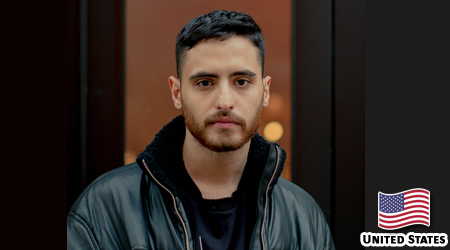Calgary Peace Prize

Calgary Peace Prize
The Calgary Peace Prize was established by the Consortium for Peace Studies in 2006 to highlight Calgary’s contribution to world peace. The prize recognizes outstanding individuals from the global community whose work has made the world a more just, safer, less violent and more equitable place.Mark Ayyash, PhD, a professor at Mount Royal University, independently oversees the prize, lecture and award ceremony.The Calgary Peace Prize Committee's approach to peace operates on three main principles. First, we emphasize people’s lived experience of war and violence in all the different forms they may take, from inter-state warfare to colonial violence to violence against women in spaces of conflict. Second, we seek to expand our horizons for understanding the various and often hidden historical, political, economic, cultural and social forces and dynamics that lead to the initiation and propagation of violence. Third, we highlight the bottom-up practices for healing, peace and reconciliation which are enacted by a whole range of social activists, ordinary people, rituals, cultural productions and civil society organizations.
| Sl | Name | Country | Flag | Year | Awarded For |
|---|---|---|---|---|---|
| 19 | Mohammed El-Kurd | Palestine | 2023 | global work for supporting peace and non-violance | |
| 18 | Fatima Hassan | South Africa | 2022 | global work for supporting peace and non-violance | |
| 17 | Stephanie Nolen | Canada | 2020 | global work for supporting peace and non-violance | |
| 16 | Anote Tong | China | 2019 | global work for supporting peace and non-violance | |
| 15 | Rosalie Abella | Canada | 2018 | global work for supporting peace and non-violance | |
| 14 | Douglas Roche | Canada | 2017 | global work for supporting peace and non-violance | |
| 13 | Wilton Littlechild | Canada | 2016 | global work for supporting peace and non-violance | |
| 12 | Marie Wilson | Canada | 2016 | global work for supporting peace and non-violance | |
| 11 | Murray Sinclair | Canada | 2016 | global work for supporting peace and non-violance | |
| 10 | Roméo Dallaire | Canada | 2015 | global work for supporting peace and non-violance | |
| 9 | Samantha Nutt | Canada | 2014 | global work for supporting peace and non-violance | |
| 8 | Emmanuel Jal | Canada | 2013 | global work for supporting peace and non-violance | |
| 7 | Izzeldin Abuelaish | Canada | 2012 | global work for supporting peace and non-violance | |
| 6 | Vandana Shiva | India | 2011 | global work for supporting peace and non-violance | |
| 5 | Sally Armstrong | Canada | 2010 | global work for supporting peace and non-violance | |
| 4 | Louise Arbour | Canada | 2009 | global work for supporting peace and non-violance | |
| 3 | Prince Hassan bin Talal | Jordan | 2008 | global work for supporting peace and non-violance | |
| 1 | Tadatoshi Akiba | Japan | 2006 | global work for supporting peace and non-violance |

Calgary Peace Prize Awardee (2030 ~ 2021)
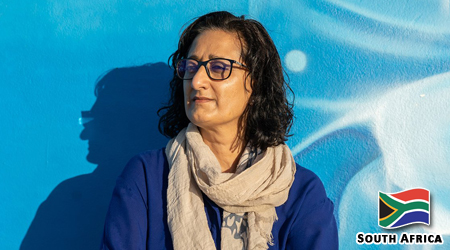
Fatima Hassan
Calgary Peace Prize 2022
Fatima Hassan
Human rights lawyer and social justice activistFatima Hassan is a human rights lawyer and social justice activist and the founder of the Health Justice Initiative (HJI) She was the executive director of the Open Society Foundation for South Africa (OSF-SA) from mid-2013 to mid-2019. She has dedicated her professional life to defending and promoting human rights in South Africa, especially in the field of HIV/AIDS where she worked for the AIDS Law Project and also acted for the Treatment Action Campaign in many of its legal cases.She has a BA and LL.B from the University of the Witwatersrand and an LL.M from Duke University. She clerked at the Constitutional Court of South Africa for Justice Kate O'Regan and has served as the special advisor to former Minister Barbara Hogan (Health; Public Enterprises). A former co-director and a founding Trustee of Ndifuna Ukwazi, Hassanpreviously served on the Boards of the Raith Foundation; SA Médecins Sans Frontières/Doctors Without Borders (MSF-SA); the International Treatment Preparedness Coalition (ITPC); and the SA Council for Medical Schemes. She is currently serving on the Board of Global Witness. She is the recipient of several fellowships and awards, including the Franklin Thomas SA Constitutional Court Fellowship, and the Tom and Andi Bernstein Distinguished Human Rights Fellowship at Yale University’s School of Law. Her opinion pieces, including for Le Monde, can be found here. She is also the host of a special COVID-19 and IP-related podcast called ACCESS.

Stephanie Nolen
Calgary Peace Prize 2021
Stephanie Nolen
Foreign correspondentStephanie Nolen is a veteran foreign correspondent who has reported from more than 75 countries around the world. Her reporting has taken her from war zones to AIDS clinics, from the mountains of Lesotho to the desert villages of Afghanistan. Her bestselling book 28 Stories of AIDS in Africa has been published in 11 countries and seven languages.She is a seven-time winner of Canada’s National Newspaper Award. She has been recognized for coverage of Africa’s AIDS pandemic; public health across the developing world; conflicts in Sudan, Uganda, Somalia, DR Congo and the Brazilian Amazon; and the perils faced by migrant children in Central America.Her multimedia project on caste and gender discrimination in India won the Ramnath Goenka Award for Excellence in Journalism presented to the top foreign correspondent covering India. She was nominated for a global 2018 Online News Award for the best multimedia project.Nolen won the Amnesty International Award for Human Rights Reporting in 2003, 2004, 2006, 2011, 2015, in 2018, for coverage of attacks on Indigenous leaders and land defenders in post-peace-process Colombia. She won the Markwell Media Award of the International Society of Political Psychologists in 2005, for her “combination of creative brilliance, humanitarian compassion, personal courage, and the relentless pursuit of truth.”28 won the 2007 PEN ‘Courage’ Award and was nominated for the 2007 Governor-General’s Award for Non-Fiction. In 2018 Nolen was chosen as an Ochberg Fellow on Journalism and Trauma at Columbia University.Nolen spent 21 years reporting for the Globe and Mail. Prior to her posting with the newspaper in Africa, she covered development issues and conflicts, including the wars in Iraq and Afghanistan. Before joining the Globe in 1998, she was based in the Middle East and wrote for publications including Newsweek and The Independent of London.She is also the author of Promised the Moon: The Untold Story of the First Women in the Space Race (2002); Shakespeare’s Face (2002), which has been published in seven countries; and Out of India (2013).A native of Montreal, Nolen holds a Bachelor of Journalism (Hons) from the University of King’s College in Halifax and a Master of Science in development economics from the London School of Economics in England. She has been conferred an honorary doctorate of civil laws degree from the University of King’s College, the University of Victoria, Guelph University and the University of Calgary. She speaks Spanish, French, Portuguese and Arabic; made a valiant if only moderately successful effort to learn isiZulu and Hindi, and recently began to study Mi’kmaq.
View More

Calgary Peace Prize Awardee (2020 ~ 2011)
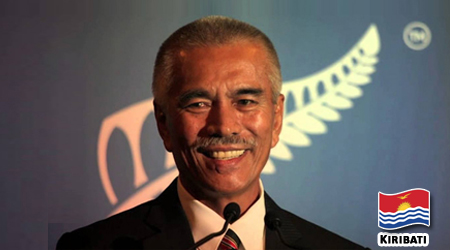
Anote Tong
Calgary Peace Prize 2019
His Excellency, Anote Tong
Former President of the Republic of KiribatiHis Excellency Anote Tong served as the fourth President of the Republic of Kiribati (pronounced Ki-ri-bas) from 2003 to 2015.With one of the lowest carbon-emission footprints in the world, Kiribati has often been described by President Tong as a “frontline country” that has been among the first to experience dramatic climate change impacts, especially in the form of rising sea levels. President Tong has worked diligently to build worldwide awareness of this potentially devastating problem and has been a strong advocate for the development of international agreements and solutions.As an extraordinary measure to set an example for the rest of the world, President Tong created the Phoenix Islands Protected Area, one of the largest marine protected areas in the world with a size of 158,000 square miles, which was inscribed as a United Nations World Heritage site in 2008.President Tong was born in 1952 on Fanning Island (also known as Tabuaeran) in the Line Islands and was a member of the Kiribati House of Parliament from the constituency of Maiana Island in the central Kiribati group. Educated in New Zealand and in England at the University of Canterbury and the London School of Economics respectively, President Tong holds a Bachelor of Science and a Master of Economics degrees.
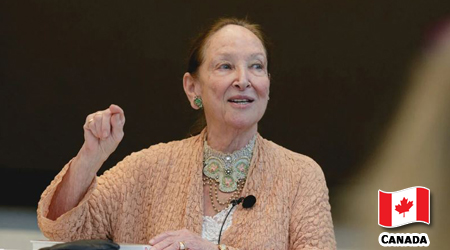
Rosalie Abella
Calgary Peace Prize 2018
Honourable Justice Rosalie AbellaJustice Abella was appointed to the Supreme Court of Canada in 2004. She is the first Jewish woman appointed to the Court.She attended the University of Toronto, where she earned a B.A. in 1967 and an LL.B. in 1970. In 1964 she graduated from the Royal Conservatory of Music in classical piano. She was called to the Ontario Bar in 1972 and practiced civil and criminal litigation until 1976 when she was appointed to the Ontario Family Court at the age of 29, the youngest and first pregnant person appointed to the judiciary in Canada. She was appointed to the Ontario Court of Appeal in 1992.She was the sole Commissioner of the 1984 federal Royal Commission on Equality in Employment, creating the term and concept of “employment equity”. The theories of “equality” and “discrimination” she developed in her Report were adopted by the Supreme Court of Canada in its first decision dealing with equality rights under the Canadian Charter of Rights and Freedoms in 1989. The report has been implemented by the governments of Canada, New Zealand, Northern Ireland and South Africa. She subsequently served as Chair of the Ontario Labour Relations Board (1984 to 1989), Chair of the Ontario Law Reform Commission (1989 to 1992), and Boulton Visiting Professor at the Faculty of Law of McGill University (1988 to 1992). She also served as a commissioner on the Ontario Human Rights Commission; as a member of the Ontario Public Service Labour Relations Tribunal; as Co-Chair of the University of Toronto Academic Discipline Tribunal; as a member of the Premier’s Advisory Committee on Confederation; and as Chair of the Study on Access to Legal Services by the Disabled.She has written over 90 articles and written or co-edited four books. She was made a Senior Fellow of Massey College in 1989, a Fellow of the Royal Society of Canada in 1997, and a Fellow of the American Academy of Arts and Sciences in 2007. She has given, among others, the Harlan Lecture at Princeton, the Ryan Lecture at Georgetown, the Winchester Lecture at Oxford, the Anderson Lecture at Yale, and was the Bullock Chair at the Hebrew University, the Mackenzie King Distinguished Visiting Professor at Harvard, the Floersheimer Distinguished Jurist in Residence at Cardozo, a Distinguished Visiting Faculty at the University of Toronto Law School, and Bright International Jurist in Residence at the University of Hawaii School of Law.She was a judge of the Giller Literary Prize; Chair of the Rhodes Selection Committee for Ontario; director of the Institute for Research on Public Policy; moderator of the English Language Leaders’ Debate in 1988; a member of the Canadian Judicial Council’s Inquiry on Donald Marshall, Jr.; Program Chair of the Governor General’s Canadian Study Conference; Chief Rapporteur in Halifax and Co-Chair in Vancouver of the 1992 Renewal of Canada Conferences; Trustee of the McGill Institute for the Study of Canada; Governor of the International Board of Governors of the Hebrew University; and Vice-Chair of the Board of Governors of the National Judicial Institute.Justice Abella has been active in Canadian judicial education, organizing the first judicial seminar in which all levels of the judiciary participated, the first judicial seminar in which persons outside the legal profession were invited to participate, the first national education program for administrative tribunals, and the first national conference for Canada’s female judges.Justice Abella was awarded the Distinguished Alumnus Award of the University of Toronto Faculty of Law; the Distinguished Service Award of the Canadian Bar Association (Ontario); the International Justice Prize of the Peter Gruber Foundation; the Human Relations Award of the Canadian Council of Christians and Jews; the Honourable Walter S. Tarnopolsky Human Rights Award; and the Bora Laskin Award for Distinguished Service in Labour Law. She has 37 honourary degrees.Justice Abella was born in a Displaced Person’s Camp in Stuttgart, Germany on July 1, 1946. Her family came to Canada as refugees in 1950. She is the daughter of Jacob and Fanny Silberman. She is married to Canadian historian Irving Abella and they have two sons, Jacob and Zachary, both lawyers.
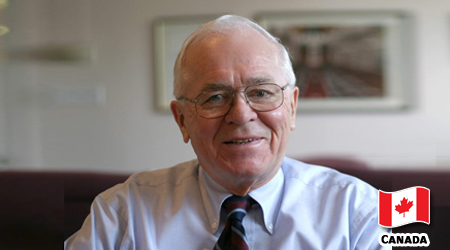
Douglas Roche
Calgary Peace Prize 2017
Honourable Douglas Roche, O.C.The Hon. Douglas Roche, O.C., is an author, parliamentarian and diplomat, who has specialized throughout his 40-year public career in peace and human security issues. He lectures widely on peace and nuclear disarmament themes.Mr. Roche was a Senator, Member of Parliament, Canadian Ambassador for Disarmament, and Visiting Professor at the University of Alberta. He was elected Chairman of the United Nations Disarmament Committee at the 43rd General Assembly in 1988.Mr. Roche was the founding Chairman of the Middle Powers Initiative, an international network of eight non-governmental organizations working for the elimination of nuclear weapons. In 2010, the City of Hiroshima named him an Honourary Citizen for his nuclear disarmament work and particularly for founding the Middle Powers Initiative.The author of 21 books, his latest is The United Nations in the 21 st. Century (Lorimer, 2015). His Memoirs, Creative Dissent: A Politician’s Struggle for Peace, was published by Novalis in 2008. A previous book, The Human Right to Peace (Novalis, 2003), was the Canadian Book Review Annual Editor’s Choice scholarly selection for July-August 2005. He has contributed chapters to 20 additional books.Mr. Roche holds nine honorary doctorates from Canadian and American universities and has received numerous awards for his work for peace and non-violence, including the Mahatma Gandhi Foundation for World Peace Award (Canada) and the United Nations Association’s Medal of Honour. In 1995, Pope John Paul II presented him with the Papal Medal for his service as Special Adviser on disarmament and security matters, and in 1998 the Holy See named him a Knight Commander of the Order of St. Gregory the Great. He received the 2003 Peace Award of the Canadian Islamic Congress and the 2005 Luminosa Award for Unity from the Focolare Movement, North America. In 2005, he has given Lifetime Achievement awards from both the Canadian Pugwash Group and the Nuclear Age Peace Foundation.
View More
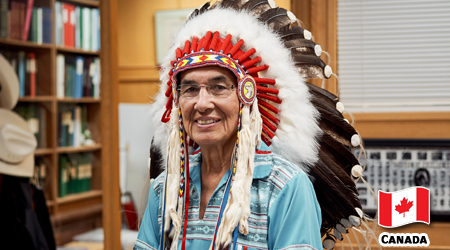
Wilton Littlechild
Calgary Peace Prize 2016
Chief Wilton Littlechild, CommissionerIn 1976, Chief Wilton Littlechild had the distinction of being the first Treaty First Nation person to acquire his law degree from the University of Alberta. He received his Bachelor of Physical Education Degree in 1967 and his Master’s Degree in Physical Education in 1975. In June of 2007, the University of Alberta bestowed the Doctor of Laws Degree on Chief Littlechild for his outstanding achievements.An avid sportsman and athlete, Chief Littlechild has won more than fifty provincial, regional, national and international championships. He has served as a coach and organizer of a sports event — being a founder of the North American Indigenous Games and has been inducted into seven Sports Halls of Fame.Chief Littlechild is a respected lawyer and operates the law firm of J. Wilton Littlechild, Barrister and Solicitor, which is situated in the Ermineskin Reserve. He is a strong advocate for the rights of Indigenous Peoples and promoter of the implementation of the treaties between the Indigenous Peoples of Canada and the Crown, now represented by the federal government. Chief Littlechild also served as the Chairperson for the Commission on First Nations and Métis Peoples and Justice Reform, mandated to review the justice system in the province of Saskatchewan.Chief Littlechild served as a Member of Parliament from 1988 to 1993 for the riding of Wetaskiwin-Rimby. He served on several senior committees in the House of Commons and was a parliamentary delegate to the United Nations. Chief Littlechild organized a coalition of Indigenous Nations that sought and gained consultative status with the Economic and Social Council of the United Nations. He was re-appointed by the E.C.O.S.O.C. President to represent North America and has completed his second and final term as the North American representative to the UN Permanent Forum on Indigenous Issues.Chief Littlechild was honoured by being appointed the Honourary Chief for the Maskwacis Crees and also honoured by the Chiefs of the Confederacy of Treaty Six First Nations as the International Chief for Treaty No. 6 Confederacy.Elected by the Chiefs of Treaties 6, 7, 8 (Alberta) as the Regional Chief for the three Treaty territories in October of 2006 to serve a three-year term. He is married to Helen Peacock and is the father of three children: Teddi, Neil and Megan.
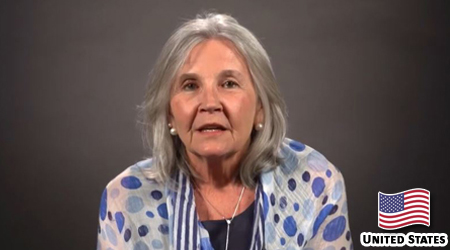
Marie Wilson
Calgary Peace Prize 2016
Dr. Marie Wilson, CommissionerMarie Wilson has more than 30 years of professional experience as an award-winning journalist, trainer, and senior executive manager. She has also been a university lecturer, a high school teacher in Africa, a senior executive manager in both federal and territorial Crown Corporations, and an independent contractor and consultant in journalism, program evaluation, and project management. She has lived, studied and worked in cross-cultural environments for almost forty years, including Europe, Africa, and various parts of Canada.As a journalist, Ms. Wilson worked in print, radio and television as a regional and national reporter, and later as the Canadian Broadcasting Corporation’s senior manager for northern Quebec and the three northern Territories. She was the first television program host of northern Canada’s flagship weekly information program, Focus North. Her reports tackled complex issues, from the Quebec sovereignty referendum and national unity debates to the national Constitutional talks of the 1980s; from the settlement of historic aboriginal rights agreements to the state of health in First Nations and Inuit communities; from Papal visits to centennial celebrations of the Riel Rebellion.As a Regional Director for the Canadian Broadcasting Corporation, Ms. Wilson was a pioneer. She launched the first Daily Television News service for northern Canada, against a backdrop of four-time zones and ten languages: English, French and eight indigenous. She developed the Arctic Winter Games and True North Concert series, to showcase northern performing artists and traditional indigenous sports for audiences across southern Canada. She fought for the recruitment and development of aboriginal staff and their on-air reflection. She acknowledged staff excellence with the CBC North Awards. She acknowledged the community with program initiatives to support and promote literacy.A career highlight was to deliver training through the South African Broadcasting Corporation as part of that country’s transition to democracy and coinciding with the start-up of South Africa’s own Truth and Reconciliation Commission. For several years she served as an associate board member of what was to become APTN, the Aboriginal Peoples Television Network. Over the years she has worked with various other boards and agencies committed to social justice, journalism and civic engagement, community, spiritual and international development, and the wellbeing of children and youth.Ms. Wilson is the recipient of a CBC North Award for Lifetime Achievement, the Northerner of the Year Award, and various awards and recognitions for journalism, writing excellence, and workplace safety initiatives. In May 2012, she was awarded an honorary Doctor of Laws degree by St. Thomas University of Fredricton, New Brunswick, in recognition of a professional career “marked by public service and social justice.” Ms. Wilson speaks English and French, with some knowledge of Spanish and Sahtu Dene. She and her husband, Stephen Kakfwi, are the proud parents of Kyla, Daylyn and Keenan, and are blessed with four grandchildren.
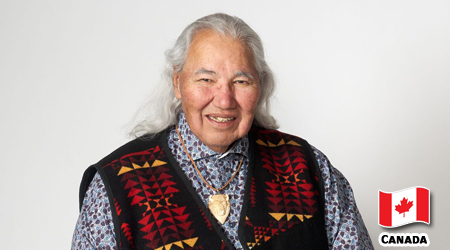
Murray Sinclair
Calgary Peace Prize 2016
TRC Commissioners, Honourable Justice Murray Sinclair, Dr. Marie Wilson and Chief Wilton LittlechildThe Honourable Justice Murray Sinclair was appointed Associate Chief Judge of the Provincial Court of Manitoba in March 1988 and to the Court of Queen’s Bench of Manitoba in January 2001. He was Manitoba’s first Aboriginal Judge.Justice Sinclair was born and raised in the Selkirk area north of Winnipeg, graduating from his high school as class valedictorian and athlete of the year in 1968. After serving as Special Assistant to the Attorney General of Manitoba, Justice Sinclair attended the Universities of Winnipeg and Manitoba and, in 1979, graduated from the Faculty of Law at the University of Manitoba.He was called to the Manitoba Bar in 1980. In the course of his legal practice, Justice Sinclair practiced primarily in the fields of civil and criminal litigation and Aboriginal law. He represented a cross-section of clients but by the time of his appointment, was known for his representation of Aboriginal people and his knowledge of Aboriginal legal issues.Shortly after his appointment as Associate Chief Judge of the Provincial Court of Manitoba in 1988, Justice Sinclair was appointed Co-Commissioner, along with Court of Queen’s Bench Associate Chief Justice A. C. Hamilton, of Manitoba’s Aboriginal Justice Inquiry. In November 2000, Justice Sinclair completed the Report of the Pediatric Cardiac Surgery Inquest, a study into the deaths of twelve children in the pediatric cardiac surgery program of Winnipeg’s Health Sciences Centre in 1994.He has been awarded a National Aboriginal Achievement award in addition to many other community service awards, as well as Honourary Degrees from the University of Manitoba, the University of Ottawa, and St. John’s College (University of Manitoba). He is an adjunct professor of Law and an adjunct professor in the Faculty of Graduate Studies at the University of Manitoba. Justice Sinclair is married to Katherine Morrisseau-Sinclair (Animiki-quay). They have four children, Manon (Miskodagaginquay) Beaudrie, James (Niigonwedom) (and his partner Lorena Sekwan Fontaine), Déne (Beendighay-geezhigo-quay), Gazheek (Gazhegwenabeek), and one granddaughter Sarah (Nimijiien Niibense) Fontaine-Sinclair.
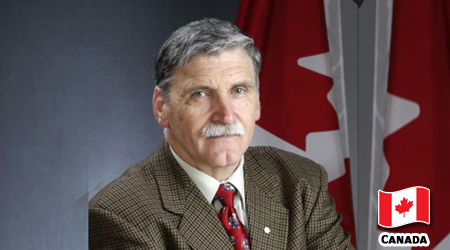
Roméo Dallaire
Calgary Peace Prize 2015
Lieutenant-General the Honourable Roméo Dallaire, retired lieutenant-generalRoméo Dallaire is a retired Lieutenant-General, former Senator, and celebrated humanitarian. Lieutenant General (LGen) Dallaire is President of the Lieutenant-General Roméo Dallaire Foundation; founder of The Roméo Dallaire Child Soldiers Initiative, an organization aimed at eradicating the use of child soldiers; an outspoken advocate for human rights, particularly war-affected children, women, the Canadian First Nations, and military veterans; and a respected champion of genocide prevention initiatives, the Responsibility to Protect doctrine, and nuclear non-proliferation, as well as a best-selling author.LGen Dallaire served in staff, training, and command positions throughout his distinguished military career in North America, Europe, and Africa, rising in rank from Army Cadet in 1960 to Lieutenant-General in 1998.Most notably, LGen Dallaire was appointed Force Commander of the United Nations Assistance Mission in Rwanda (UNAMIR) prior to and during the 1994 genocide. LGen Dallaire provided the United Nations with information about the planned massacre, which ultimately took more than 800,000 lives in less than 100 days yet permission to intervene was denied and the UN withdrew its peacekeeping forces. Gen Dallaire, along with a small contingent of Ghanaian soldiers and military observers, disobeyed the command to withdraw and remained in Rwanda to fulfill their ethical obligation to protect those who sought refuge with the UN forces.His courage and leadership during this mission earned him the Meritorious Service Cross, the United States Legion of Merit, the Aegis Award on Genocide Prevention, and the affection and admiration of people around the globe is a defiant dedication to humanity during that mission is well-documented (e.g. The Last Just Man, Shake Hands with the Devil: The Journey of Romeo Dallaire, The Lion, The Fox, and The Eagle), as are the personal consequences he continues to suffer and his subsequent commitment to fellow victims of Post-Traumatic Stress Disorder.LGen Dallaire was born in Denekamp, Holland, on 25 June 1946, to Canadian Army Sergeant Roméo Louis Dallaire and Catharina Vermaesen Dallaire. He was raised and educated in Canada, joining le Collège Militaire Royal de Saint-Jean in 1964 (later assuming command of this institution as Brigadier-General in 1989) and graduating with a Bachelor of Science degree from the Royal Military College in 1969. e also attended the Canadian Land Forces Command and Staff College, the United States Marine Corps Command and Staff College in Virginia, and the United Kingdom Higher Command & Staff Course. Gen Dallaire holds honorary doctorates and fellowships from nearly three dozen universities in Canada and the United States.LGen Dallaire is an Officer of the Order of Canada, a Grand Officer of the National Order of Quebec, and a Commander of the Order of Military Merit. He is the recipient of the United Nations Association of Canada’s Pearson Peace Medal, the Arthur Kroeger College Award for Ethics in Public Affairs from Carleton University, the Laureate of Excellence from the Manitoba Health Sciences Centre, and the Harvard University Humanist Award.He is the author of two best-selling books. His harrowing experiences in Rwanda are detailed in Shake Hands with the Devil — The Failure of Humanity in Rwanda, which won the Governor General’s Literary Award for Non-Fiction in 2004 and the Shaughnessy Cohen Prize for political writing awarded by the Writers’ Trust of Canada. It provided the basis for an Emmy Award-winning documentary as well as a major motion picture of the same name; it has also been entered into evidence in war crimes tribunals trying the perpetrators of the Rwandan genocide.LGen Dallaire’s most recent book, They Fight Like Soldiers; They Die Like Children — the Global Quest to Eradicate the Use of Child Soldiers, introduces the Child Soldier phenomenon and solutions to eradicate it: a mission to which LGen Dallaire has committed the rest of his life.
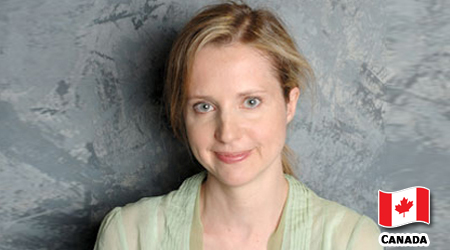
Samantha Nutt
Calgary Peace Prize 2014
Dr. Samantha Nutt, award-winning humanitarian, bestselling author and founderDr. Samantha Nutt, MD, MSc, CCFP, FRCPC, C.M., is an award-winning humanitarian, bestselling author and acclaimed public speaker. A medical doctor and a founder of the renowned international humanitarian organization War Child, Dr. Nutt has worked with children and their families at the frontline of many of the world’s major crises — from Iraq to Afghanistan, Somalia to the Democratic Republic of Congo, and Sierra Leone to Darfur, Sudan. A leading authority on current affairs, war, international aid and foreign policy.Dr. Nutt is one of the most intrepid and recognized voices in the humanitarian arena. With a career that has spanned more than two decades and dozens of conflict zones, her international work has benefited many thousands of war-affected children globally.Dr. Nutt’s critically acclaimed book, entitled Damned Nations: Greed, Guns, Armies & Aid, was a #1 bestseller in Canada. Damned Nations was released on October 25, 2011, through McClelland & Stewart Ltd., and is available in North America. Lewis Lapham declared it a “brave and necessary book”, while the Literary Review of Canada called it a “brilliant polemic.” Damned Nations is a bracing and uncompromising account of Dr. Nutt’s work in some of the most devastated regions of the world. For more information, please visit warchild.ca or samanthanutt.com.
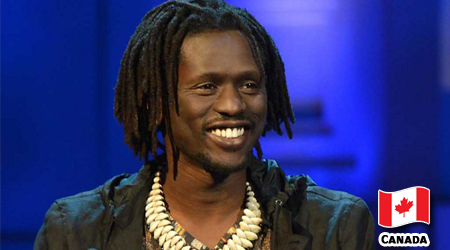
Emmanuel Jal
Calgary Peace Prize 2013
Born into an Albanian peasant family in Skopje in the former Yugoslav Republic
of Macedonia, Agnes Gonxha Bojaxhiu (1910–97) went to Ireland in 1928 to
enter the religious order of the Sisters of Loreto. Only six weeks later, she requested
and obtained permission to sail to India as a teacher, to work with the poor in
Calcutta. In 1948, she left the order to found the Society of the Missionaries of
Charity. Mother Teresa of Calcutta, who was awarded the Nobel Prize for Peace in
1979, devoted her whole life to serving the ‘poorest of the poor’, to promoting a peace
that is inseparable from the dignity of each individual, and to fighting injustice.
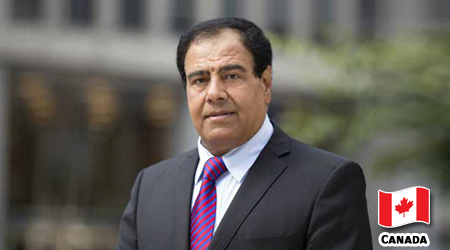
Izzeldin Abuelaish
Calgary Peace Prize 2012
Dr. Izzeldin Abuelaish, The Gaza DoctorThe Consortium for Peace Studies at the University of Calgary is extremely pleased to announce its sixth annual Calgary Peace Prize recipient — Dr. Izzeldin Abuelaish (fondly known as the Gaza Doctor). His condemnation of violence and his unwavering commitment to promoting peace makes him an outstanding nominee. We are honoured to recognize the strength of his conviction to neither hate nor seek revenge, and the multiple ways in which he brings this vital message not only to Israelis and Palestinians but also to the global community.Dr. Izzeldin Abuelaish, MD, MPH, a Palestinian medical doctor who was born and raised in the Jabalia refugee Camp is a passionate and eloquent proponent of peace between Palestinians and Israelis. He received his elementary, preparatory and secondary education in the refugee camp schools. He received a scholarship to study medicine in Cairo, Egypt and then a diploma in Obstetrics and Gynecology from the Institute of Obstetrics and Gynecology University of London.From 1997 to 2002 completed a residency in OB/Gyn at the Soroka University hospital in Beer Sheva Israel followed by a subspecialty in Fetal medicine in Italy and Belgium; then a Master in Public health (Health Policy and Management) from Harvard University.Before his three daughters were killed in January 2009 during the Israeli incursion into Gaza, Dr. Abuelaish worked as a researcher at the Gertner Institute at the Sheba Hospital in Tel Aviv.Abueaish has been an important figure in Israeli-Palestinian relations for years, working in Israeli hospitals, treating Israeli and Palestinian patients and fully believing that health is an engine for the journey to peace. This horrific tragedy did not harden Abuelaish’s heart; neither did it weaken his resolve to act for humanity. He continues to live up to the description bestowed upon him by an Israeli colleague, as a magical, secret bridge between Israelis and Palestinians.Dr. Izzeldin Abuelaish currently is an Associate Professor of Medicine at the Dalla Lana School of Public Health, University Of Toronto.He has been invited to speak in The European Parliament, Belgian Parliament, House of Commons, the American Congress, State Department, Forum 2000 in Prague. In addition, he has given talks all over the world in academic institutions, universities and organizations in Canada, USA and Europe.About his Book: “I Shall Not Hate”You can do a lot. You can support justice for all by speaking out loudly to your family, friends, community, politicians and religious leaders. You can support foundations that do good work. You can volunteer for humanitarian organizations. You can vote regressive politicians out of office. You can do many things to move the world toward greater harmony…“I know that what I have lost, what was taken from me, will never come back. But as a physician and a Muslim of deep faith, I need to move forward to the light, motivated by the spirits of those I lost. I need to bring them justice… I will keep moving but I need you to join me in this long journey.”— excerpt I Shall Not HateDr. Izzeldin Abuelaish — now known simply as “the Gaza doctor” captured hearts and headlines around the world in the aftermath of a horrific tragedy: on January 16, 2009, Israeli shells hit his home in the Gaza Strip, killing three of his daughters and a niece.By turns inspiring and heartbreaking, hopeful and horrifying, this is Abuelaish’s account of a Gazan life in all its struggle and pain. A Palestinian doctor who was born and raised in the Jabalia refugee camp in the Gaza Strip, Abuelaish is an infertility specialist who lived in Gaza but plied his specialty in Israeli hospitals. From the strip of land, he calls home (a place where 1.5 million refugees are crammed into 360 square kilometres of land), the Gaza doctor has been crossing the lines that divide the region for most of his life, as a physician who treats patients on both sides of the border and as a humanitarian who sees the need for improved public health and education for women as the way forward in the Middle East.But it was Abuelaish’s response to the loss of his children that made news and won him humanitarian awards around the world. Instead of seeking revenge or sinking into hatred, in this personal account of his life, Izzeldin Abuelaish is calling for the people of the Middle East to start talking to each other. His deepest hope is that his daughters will be the last sacrifice on the road to peace between Palestinians and Israelis.Since I Shall Not Hate was first published in Canada in early 2010, it has been translated into fifteen languages and Dr. Abuelaish has travelled all over the world to spread his message of peace. He has received countless personal messages from readers who were deeply inspired by his story and his determination to be a force for good in the world rather than succumb to anger and hate. Dr. Abuelaish has been featured at conferences and literary events attended by thousands of participants from all walks of life.
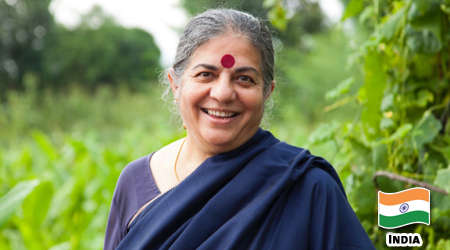
Vandana Shiva
Calgary Peace Prize 2011
Dr. Vandana Shiva, physicist, philosopher, environmental activist, eco feminist and authorDr. Vandana Shiva is a trained-Physicist (received her Ph.D. from the University of Western Ontario), philosopher, environmental activist, eco-feminist and author of several books. Shiva has fought for changes in the practice and paradigms of agriculture and food, intellectual property rights, biodiversity, biotechnology, bioethics, and genetic engineering are among the fields where Shiva has contributed intellectually and through activist campaigns. She has assisted grassroots organizations of the Green movement in Africa, Asia, Latin America, Ireland, Switzerland and Austria with campaigns against genetic engineering. In 1982, she founded the Research Foundation for Science, Technology and Ecology, which led to the creation of Navdanya, a network of seed keepers and organic producers spread across 16 states in India which has helped set up 54 community seed banks across the country; trained over 500,000 farmers in seed sovereignty, food sovereignty and sustainable agriculture over the past two decades; and helped set up the largest direct marketing, fair trade organic network in the country. It has created awareness of the hazards of genetic engineering, defended people’s knowledge of biopiracy and food rights in the face of globalization and climate change and is a women-centred movement for the protection of biological and cultural diversity. She has established a school for sustainability Bija Vidyapeeth on the Navdanya Biodiversity Farm in Doon Valley.Her most recent books are Soil Not Oil, Earth Democracy and Water Wars. She is on the Board of the International Forum on Globalization and World Future Council and she is the Vice President of the global movement Slow Food International. Dr. Shiva has received numerous awards like the Right Livelihood Award (also known as the ‘Alternative Nobel Prize’), Order of the Golden Arc, & most recently she won the 2010 Sydney Peace Prize for her commitment to social justice. And for her work on the empowerment of women in developing countries, her advocacy of the human rights of small farming communities, and her scientific analysis of environmental sustainability.

Calgary Peace Prize Laureates (2010 ~ 2006)
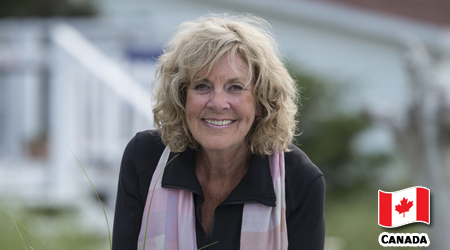
Sally Armstrong
Calgary Peace Prize 2010
Sally Armstrong, human rights activist, documentary filmmaker and authorAs a world-renowned human rights activist, documentary filmmaker and award-winning author, Ms. Armstrong have covered stories about women and girls in zones of conflict all over the world. From Bosnia and Somalia to Rwanda and Afghanistan, her eyewitness reports have earned her awards including the Gold Award from the National Magazine Awards Foundation and the Author’s Award from the Foundation for the Advancement of Canadian Letters. She received the Amnesty International Media Award in 2000 and again in 2002. Sally is the co-producer and host of several documentaries including They Fell From the Sky which aired on CBC’s Rough Cuts in November 2001; The Daughters of Afghanistan aired on CBC Newsworld, The Passionate Eye on March 2, 2003. In 1996, the YWCA of Toronto honoured Sally with the prestigious Women of Distinction Award in Communications. In 1997, she received the Achievement Award for Human Rights for Women from Jewish Women International; in 1998, Media Watch’s Dodi Robb Award and, in 2003, the Foundation Award for Outstanding Achievement from the National Magazine Awards Foundation. In 2005, she received the Athena International Award (Chicago), the World of Difference Award from the International Alliance for Women (Florida) and the Red Cross Humanitarian Award — New Brunswick Region. In 2008 she received the Clarkson Laureate for public service at Massey College, University of Toronto. And in May 2008, she received the Lifetime Achievement Award from the Canadian Journalism Foundation.She received an Honorary Doctor of Laws degree from Royal Roads University in 2000, an Honorary Doctor of Letters from McGill University at the October 2002 convocation and, in 2004, an Honorary Doctor of Letters from St. Thomas University. In 2007, she was made Doctor of the University at the University of Ottawa and received an Honorary Doctor of Laws from Guelph University, and, in 2009, a Doctor of Laws from Mount Allison University. In 1998, she was made a Member of the Order of Canada.Her book — Veiled Threat: The Hidden Power of the Women of Afghanistan was published by Penguin Books on May 23, 2002. The Nine Lives of Charlotte Taylor was published by Random House in March 2007. Her new book — Bitter Roots, Tender Shoots: The Uncertain Fate of Afghanistan’s Women — was published in November 2008.
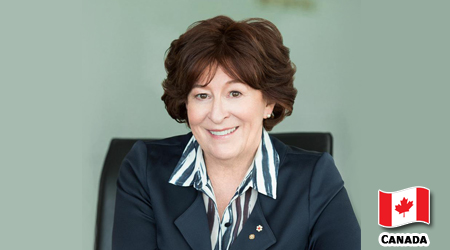
Louise Arbour
Calgary Peace Prize 2009
Honourable Louise Arbour, C.C., LL.L, LL.D (hon)In October 2006, the Consortium for Peace Studies inaugurated the Calgary Peace Prize, which was awarded to Mayor Akiba of Hiroshima, Japan. The Calgary Peace Prize Dinner is the Consortium’s premier public event and its major fundraiser. The 2009 recipient of the Calgary Peace Prize was the Honourable Louise Arbour C.C., LL.L, LL.D (hon), who served as United Nations High Commissioner for Human Rights from 2004 to 2008. Ms. Arbour, a Canadian national, began her academic career in 1974. In 1987, she was nominated Associate Professor and Associate Dean at Osgoode Hall Law School of York University in Toronto, Canada. In December of 1987, she was appointed to the Supreme Court of Ontario (High Court of Justice) and in 1990 she was appointed to the Court of Appeal for Ontario. In 1995, Ms. Arbour was appointed Commissioner to conduct an inquiry into the Prison for Women in Kingston, Ontario. In 1996, she was appointed by the Security Council of the United Nations as Chief Prosecutor for the International Criminal Tribunals for the former Yugoslavia and for Rwanda. In 1999, she was appointed to the Supreme Court of Canada.Ms. Arbour graduated from College Regina Assumpta, Montreal in 1967 and completed an LL.L (with distinction) from the Faculty of Law, University of Montreal in 1970. Following the Quebec Bar Admission Course, she was called to the Quebec Bar in 1971 and the Ontario Bar in 1977. Ms. Arbour has received honorary doctorates from some thirty Universities and numerous medals and awards. She is a member of many distinguished professional societies and organizations and serves on the Boards of the International Crisis Group and of the Human Rights Watch. Louise Arbour was born on 10 February 1947 in Montreal, Quebec and has three children. She is fluent in French and English.Ms. Arbour was honoured at the 3rd Annual Calgary Peace Prize Dinner in 2009 at the Calgary Zoo’s Safari Lodge.
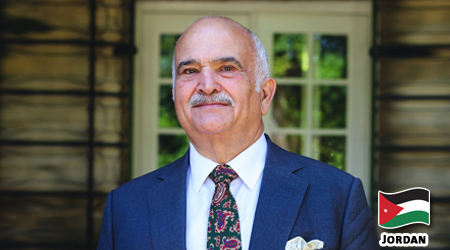
Hassan bin Talal
Calgary Peace Prize 2008
Prince El Hassan bin Talal of the Hashemite Kingdom of JordanIn October 2006 the Consortium for Peace Studies inaugurated the Calgary Peace Prize, which was awarded to Mayor Akiba of Hiroshima, Japan. The Calgary Peace Prize Dinner is the Consortium’s premier public event and its major fundraiser. This year’s recipient was His Royal Highness Prince El Hassan bin Talal of the Hashemite Kingdom of Jordan. The Prince has a long record of service in the interests of global peace. From 1999 to 2006 he served as Moderator of the World Conference of Religions for Peace; concurrently he was President of the Club of Rome and co-chaired the United Nations Independent Commission on International Humanitarian Issues. He is the author of 5 books, the recipient of numerous honorary degrees and a tireless worker on behalf of inter-religious understanding. A figure of international stature and influence, Prince El Hassan has played a key role in furthering global understanding at the highest levels. The Consortium was honoured that the Prince agreed to accept the Prize.The Second Annual Calgary Peace Prize Dinner was held on March 31, 2008, in Calgary with over two hundred guests attending. The Prince was, unfortunately, unable to attend in person, however, he delivered his acceptance speech via teleconferencing, emphasizing the importance of developing a new paradigm for human relations at the global level. He spoke eloquently about the empowerment of the poor through legal rights as a key element in avoiding civil strife. His Honour, the Lieutenant-Governor of Alberta, Mr. Norman Kwong, and the Chancellor of the University of Calgary, Ms. Joanne Cuthbertson, presented the Prize in absentia to Professor Uner Turgay of the Islamic Studies Institute, McGill University, who accepted it on behalf of His Royal Highness. The well-known singer, Raffi, provided entertainment. The Consortium prepared a short DVD of the dinner, which was sent to HRH.On the gracious invitation of Prince Hassan, Consortium Co-chair Professor George Melnyk travelled to Amman, Jordan at the end of April to present the Calgary Peace Prize to His Royal Highness in person. Chancellor Cuthbertson accompanied Prof. Melnyk to invest His Royal Highness with an Honourary Degree from the University of Calgary. The conferral of the degree was held in the morning at the residence of the Prince and in the evening the Calgary Peace Prize was presented at the residence of the Canadian ambassador to Jordan and Iraq, Ms. Margaret Huber. Both the Chancellor and Prof. Melnyk were guests of the Prince during their stay in Jordan. One of the outcomes of the trip to Jordan was an invitation from the Prince’s office to host student interns from Alberta as an educational exchange.
View More
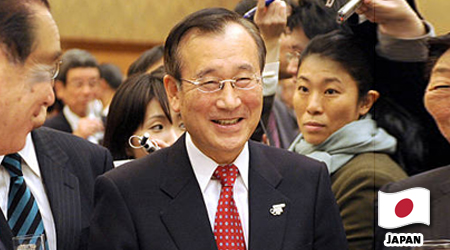
Tadatoshi Akiba
Calgary Peace Prize 2006
Dr. Tadatoshi Akiba, Mayor of Hiroshima and President of Mayors for PeaceThe Consortium for Peace Studies was pleased to inaugurate the Calgary Peace Prize in November 2006. The $5,000 prize was awarded to Dr. Tadatoshi Akiba, Mayor of Hiroshima and President of Mayors for Peace. Dr. Akiba received the prize from Dr. Harvey Weingarten, President, University of Calgary and Mr. Dave Bronconnier, Mayor, City of Calgary. There were 180 guests at the fundraising dinner held in the Safari Lodge, Calgary Zoo. The Master of ceremonies was Dr. Kathleen Scherf, Dean, Faculty of Communication and Culture. Other dignitaries seated at the head table included Senator and Mrs. Douglas Roche of Edmonton, the Consul-General of Japan, Mr. Soemu Horie and Vice-Consul, Emi Mashiko. The following evening the Consul-General hosted a private dinner in Mayor Akiba’s honour, attended by representatives of the Consortium. The Consulate-General of Japan was also instrumental in suggesting the Japanese cultural performers whose music and dance enhanced the evening. Mayor Akiba, who received a standing ovation, spoke eloquently on the subject of nuclear disarmament. The next day he spoke with about 50 students and faculty members at the University as part of the Consortium’s PeaceTalks series, showing graphic slides of the consequences of the nuclear bombing of Hiroshima. We are most grateful to Mayor Akiba for accepting the Calgary Peace Prize and devoting so much of his precious time to the event.



